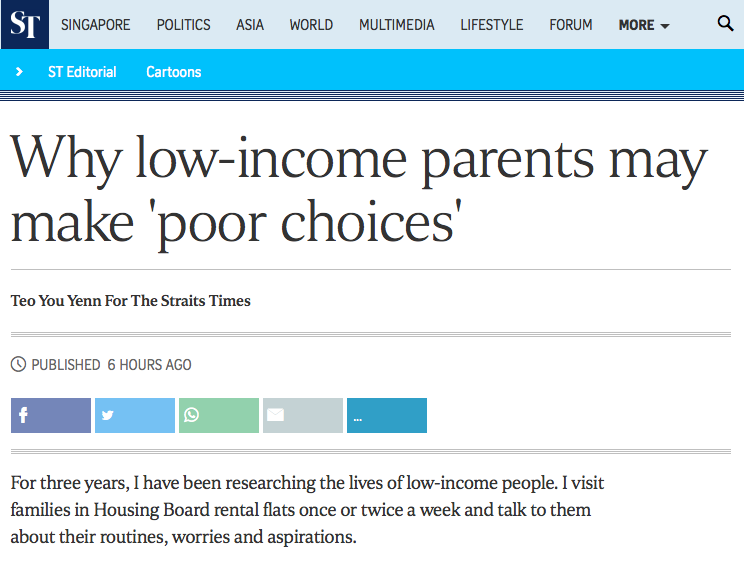If you haven't already seen somebody else sharing this piece on your Facebook news feed, you can count this as someone sharing it with you:
 Screenshot from The Straits Times article. Click to access.
Screenshot from The Straits Times article. Click to access.
It's an opinion piece by Associate Professor Teo Yu Yenn, who teaches sociology at Nanyang Technological University (NTU), about the priorities, concerns and needs of lower-income families.
As the description in the image above suggests, she is well-qualified to talk about this, considering that she's been speaking to families every week for three years — even if she herself isn't from a similar background.
Apart from writing a book on this, Teo has also contributed to TODAY on family policies and government's fertility measures.
In case you find it a bit too long, we've extracted the key points she makes in her piece:
1. Parents in low-income situations care just as much about their children as those earning more than them.
Just because they have less money or resources to work with, some might mistakenly assume parents with less end up neglecting, or de-prioritising, their children's needs. Teo shows this isn't true at all:
Contrary to stereotypes, low-income parents care for their children in ways no less profound than better-off parents. They include parents who have been drug addicts, incarcerated, or divorced.
Their devotion to their children is more difficult and requires more of them than my devotion to mine. Many have long, inflexible work hours in physically taxing jobs. They have multiple dependants, heavy burdens of housework, and additional labour due to being low-income (for example, going to the post office weekly to top up their utilities credit). Parents face great financial stress, worrying about food, clothes and shelter. While the better-off in Singapore complain about children having excess tuition and enrichment classes, low-income parents lack resources to provide those things, which are not only necessities for succeeding in the school system, but also keep children occupied. Most poignantly, low-income parents need their children to listen to them at the same time that they tell them "don't be like me".
2. "Problematic" parents or low-income families are stereotyped as representative of all low-income people.
Teo points out that most of the time, we hear about low-income families who end up in some kind of trouble — parents are then portrayed in these stories as neglectful or abusive, and their cases become generalised as the norm.
...Comparable actions are judged differently across class: A child may be left alone at home after school, or left with a grandparent or domestic worker. In both the low-income and better-off cases, the situation arises because parents need to work, but the former is quickly judged as neglect while the latter is acknowledged as necessity.
Certainly, there are parents who are neglectful or abusive, but this is no less true among higher-income ones. Caricatures of low-income parents cannot be the starting point for public discussions of poverty and social inclusion.
3. The problem with "don't blame children for their parents' bad choices":
Teo mentioned a previous Straits Times op-ed by one of their own writers, manpower correspondent Toh Yong Chuan, pointing out that the message is powerful, but also unnecessarily pinning the blame on parents, not all of whom fall into the category his piece seems to place them into:
Yet, it does not accurately reflect the general realities of low-income families' lives. Most of those parents are doing the best they can — at work and at home — under difficult circumstances. It is not "bad choices" per se that are the problem. They have limited options and face especially negative consequences when they make missteps.
She also points out that
a) the poor don't always have access to the same "good choices" that their wealthier counterparts may have;
b) they don't have the resources (money, connections) to buffer or help remedy any "bad choices" they make;
and c) the outcomes of two people making the same "bad choices" can differ greatly in extent between a "have" and a "have not".
And she ends with this really impactful paragraph:
Better-off Singaporeans should care about low-income people because they are a part of our society... Like me, they are people with hopes, joys, needs and disappointments. They work hard and make mistakes, as I do. They deserve respect and dignity, no less than I. The deep social gulf between us negates our shared well-being. I want my child to grow up in a society where she has the same opportunities as their children, not more — a society that truly values hard work, equality and justice.
The TL;DR? Care about those around you with less than you. Treat them with dignity, as an equal. Don't judge their circumstances or background, or their parents. They're more like you than you might think.
Top photo from Thinkstock.
If you like what you read, follow us on Facebook and Twitter to get the latest updates.
If you like what you read, follow us on Facebook, Instagram, Twitter and Telegram to get the latest updates.
